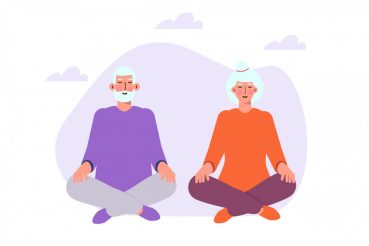
Mindfulness can improve mental and physical well-being
Mindfulness has become a common self-care practice to improve mental and physical well-being, decrease symptoms of stress and improve relaxation and concentration. Mindfulness can be defined as a state that can be achieved through focusing one’s awareness on the present using mind and breath. Mindfulness can be used as a part of self-care practice, or as mindfulness-based intervention (MBIs). Mindfulness-based interventions are used as a prevention and treatment for depression, anxiety, stress and other psychiatric disorders, and they can be practiced through various exercises and assignments aimed at developing mindfulness through formal practice and in daily life.
New research project about mindfulness in later life
At KTH we are investigating if and how AI-mediated mindfulness practice could promote the well-being of older adults aged 65 and over. The project explores the use of mobile applications in mindfulness practice and aims to design a new conversational mindfulness application through participatory design with older adults.
Older adults could significantly benefit from mindfulness practice, but most mobile health applications are not developed based on their unique needs and interests. Conversational applications, such as chatbots or virtual assistants can decrease many technology adoption barriers that older adults typically experience with digital technologies and improve the interactivity with the device.
What are the benefits of mindfulness practice in daily life?
Mindfulness practice has shown to be associated with reduced levels of stress, anxiety and depressive symptoms. Mindfulness can facilitate compassionate and self-compassionate thinking, which may reduce negative emotions and thoughts experienced in daily life. Mindfulness can also be used as a treatment for physical symptoms, such as chronic pain, fatigue and shortness of breath.
Mindfulness technologies today consist of mobile health applications or videos providing guided mindfulness training. In this project, we aim to use and develop a conversational mobile application that can provide a more personalised, adaptive and accessible mindfulness experience in comparison to traditional methods of mindfulness practice. This application can be designed to have customisable guidance, interactive features, reminders, progress tracking and social features.
“I am interested in mindfulness – how can I participate in the project”?
We are looking for older adults aged 65 and over who would like to use a mindfulness application for a 3-week period at their home. Participation includes an interview before and after using the application. No previous experience of mindfulness is needed, but we recommend that you are comfortable with using a mobile application in Swedish.
We will soon open the link for registration on the KTH website. You can also register by sending your contact information to to: mccarren@kth.se.
By participating in the study, you will have a possibility to test a mobile application in mindfulness practice and contribute to increased scientific knowledge and understanding of the benefits of mindfulness for older adults.
Research team:
Lucy McCarren, PhD student, Department of Biomedical Engineering and Health Systems, KTH
Sanna Kuoppamäki, Assistant Professor, Department of Biomedical Engineering and Health Systems, KTH